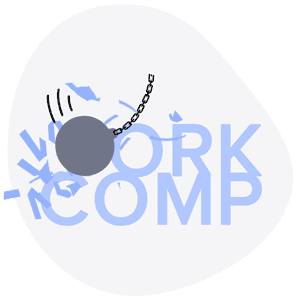WCF Falsely Demands QME Refund

A friendly reminder to all California Qualified Medical Evaluators (QMEs) and Agreed Medical Evaluators (AMEs): when a claims administrator demands a refund of reimbursement for Medical-Legal services which you have provided, you are within your legal rights to tell said claims administrator to buzz off.
WCF Insurance recently sent a letter to a QME incorrectly insisting that WCF had accidentally paid twice for a Medical-Legal evaluation — yet mysteriously, WCF referenced only a single check in the letter. The QME maintains that only one check was received, for exactly the correct amount.
Fortunately for the QME, California workers’ comp protects the provider from WCF’s apparent…shall we say, failure of accounting.
WTF, WCF?
The QME, a daisyCollect client, reached out to us upon receipt of the letter from WCF, which insists in stark terms that the QME owes the refund by a certain (wholly arbitrary) deadline. Oddly enough, the letter confirms the amount billed and paid as being exactly the same, $4,223.50 — but lists an additional $4.223.50 as the amount by which WCF supposedly overpaid.
Even the WCF letter (below) indicates that WCF did not overpay the QME.
In typical collections-letter bullying prose, WCF insists “We must receive the above refund, or hear from you, within the specified period of time, by the due date of 01/16/2023. This is the only notice you will receive from us.”
daisyCollect agents instructed the QME to take the only reasonable course of action: toss the letter in the shredder, and lose not a second’s sleep. To be absolutely clear, there have only been two scenarios in which a California workers’ comp provider is legally obligated to refund a payer:
- If a separate reimbursement contract under California Labor Code Section 5307.11 stipulates refunds in the event of overpayment, or
- If the Workers’ Compensation Appeals Board (WCAB) or a judge orders a refund, typically in the event of fraud or unjust enrichment
Neither of which applies here, considering that as the QME insists, WCF has not sent a second check, nor did WCF reference a second check in their own letter. Naturally, a provider who was legitimately and knowingly overpaid can (and should) preclude a pointless dispute by returning the funds in question, without necessitating the involvement of a judge. Otherwise, providers should not allow themselves to be intimidated.
Moreover, The California Court of Appeals, 2nd District, ruled in American Psychometric Consultants, Inc. v. Workers' Comp. Appeals Bd. (1995) that letting claims administrators pursue refunds would open a reimbursement Pandora’s box:
Approving restitution...would set a precedent which would have unfortunate consequences for the workers' compensation system...No one can operate a business on receipts only conditionally possessed, and medical providers are no exception.
We’ve encountered this situation several times over the years. For that reason, we once again remind readers that California has made obtaining correct, timely reimbursement difficult enough for providers. For claims administrators to take reimbursement back is not an option.
Correction and Disclaimer: A previous version of this article implied that providers are not obligated to restore funds in the event of a known, legitimate overpayment by the claims administrator. daisyBill is not a law firm, nor does it offer legal advice. Do not take action in reliance on the contents of this message without conducting your own appropriate legal research or seeking the advice of counsel.
Med-Legal billing requires specialized expertise. daisyCollect professionals use our advanced software (and years of experience) to protect your practice. Learn more and request a demo below:
LEARN MORE
DaisyBill provides content as an insightful service to its readers and clients. It does not offer legal advice and cannot guarantee the accuracy or suitability of its content for a particular purpose.





.png)
